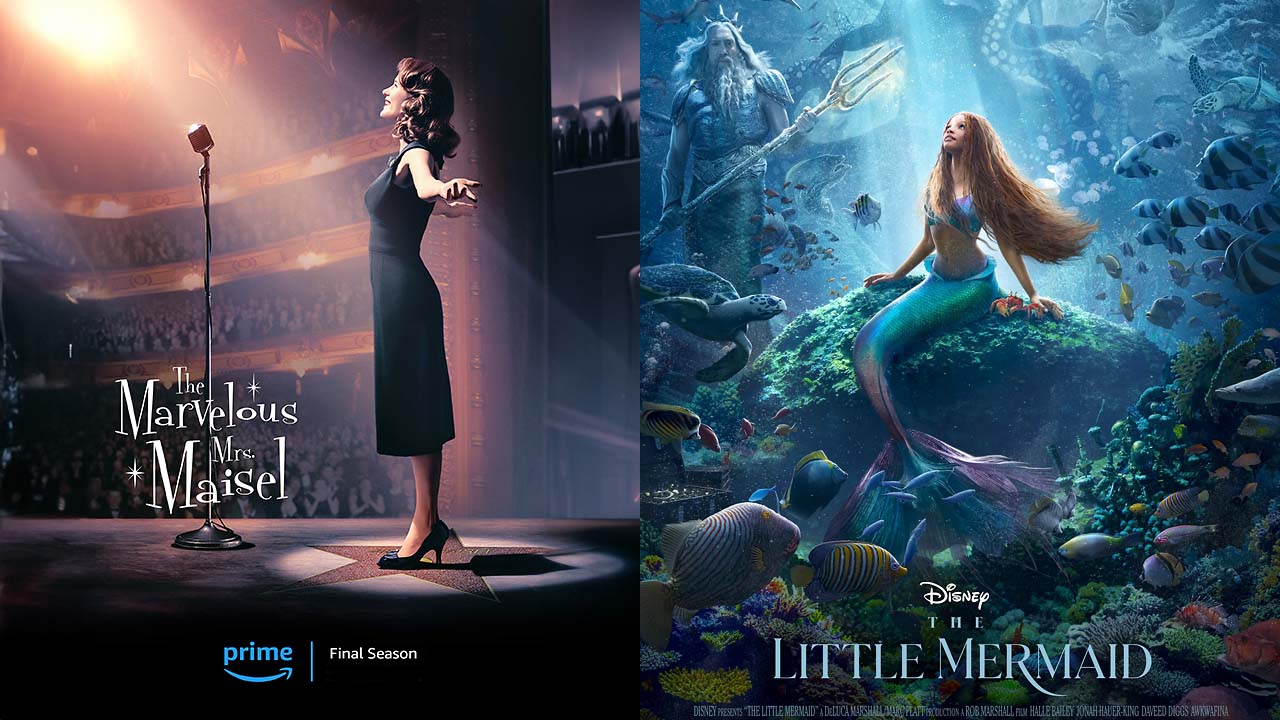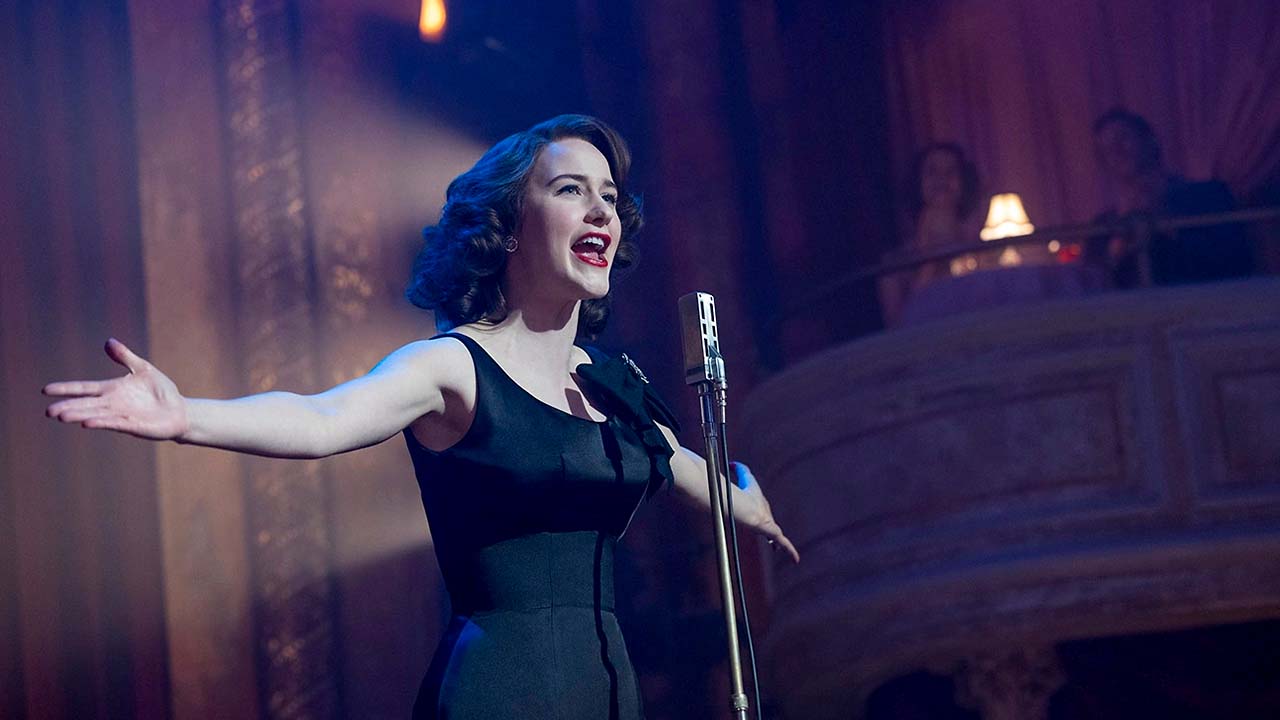Susan Granger on Stage & Screen

The Marvelous Mrs. Maisel

Are you ready for the fifth and final season of “The Marvelous Mrs. Maisel”?
If you haven’t been watching, this witty, wisecracking dramedy revolves around a bright and beautiful Manhattan wife and mother, Miriam “Midge” Maisel (Rachel Brosnahan), who, after discovering her husband Joel (Michael Zegen) cheating, marches into an East Village comedy club, grabs the microphone and electrifies the audience with an impromptu rant.
Created by Amy Sherman-Palladino (“Gilmore Girls”) with her husband, Daniel Palladino, the concept profiles a Jewish woman who thinks she ‘has it all’ by 1950 standards only to discover she’s one helluva comedian.
It became the first TV show on a streaming platform to win an Emmy for Outstanding Comedy Series; subsequent seasons amassed 66 Emmy nominations with 20 wins.
Battling rival Sophie Lennon (Jane Lynch) and boosted by Lenny Bruce (Luke Kirby), the first four seasons chronicle Midge’s journey as she pursues a career in the male-dominated stand-up comedy profession, aided by her intrepid manager, Susie Meyerson (Alex Borstein). In a flash-forward segment, it becomes obvious that Susie also becomes a major player — being ‘roasted’ at the famed Friars Club.
There was a major cultural shift for women and families during the 1950s and 1960s. While Midge is still living on the Upper West Side with her two young children and neurotic parents, Abe and Rose Weissman (Tony Shaloub, Marin Hinkle), she lands a job as a writer for a late-night TV talk show.
“Midge was like a female Lenny Bruce in the sense that she’s stream-of-consciousness and talking about her day-to-day,” explains Alex Borstein. “She’s extremely forward-thinking as a divorced woman raising kids.”
Tying up the plot’s loose strands in the last episodes, it become obvious that resilient Mrs. Maisel has hit the ‘big-time’ — but what does that really mean for her and those around her? What are the consequences of her choices? And what has she sacrificed?
On the Granger Gauge of 1 to 10, “The Marvelous Mrs. Maisel: Season Five” is an insightful, unabashedly poignant 8 — streaming on Prime Video.
The Little Mermaid

Why the live-action remake of Disney’s beloved 1989 animated classic “The Little Mermaid”? Because it’s “woke” 2023 — when audiences may want to see a more dutiful, diversity-aware approach to race and gender.
Sweetly guileless Ariel (Grammy-nominated Halle Bailey) is one of King Triton’s (Javier Bardem) many, multiethnic mermaid daughters. Despite her widowed father’s disapproval, she avidly collects artifacts from the human world that she scavenges from shipwrecks with the help of her fish friend Flounder (voiced by Jacob Tremblay) and Scuttle (voiced by Awkwafina), a squawking seagull.
One night when a storm decimates a birthday celebration aboard a fishing vessel, Ariel rescues Prince Eric (Jonah Hauer-King) from drowning. She sings to him while swimming him safely to shore. But when other humans approach, she dives back under the waves.
Yearning to frolic with Eric on his Caribbean island, Ariel falls prey to Triton’s wicked sister, the banished sea witch/half-octopus Ursula (bold and brassy Melissa McCarthy), who offers to change her tail into legs in exchange for her voice.
Beguiling yet mute, Ariel will then have three days to convince Eric that she’s, indeed, his true love; if she fails, she will be enslaved to diabolical Ursula forever.
Based on Hans Christian Andersen’s fantasy with character backstories added by screenwriters David Magee, John DeLuca and director Rob Marshall, it’s actually a misnomer to call this a ‘live-action’ film since Flounder, Scuttle and the irascible crab Sebastian (voiced by Daveed Diggs), along with Triton’s ‘merpeople,’ are all computer-generated.
Adding to the score by Alan Mencken and Howard Ashman, there’s new music by Lin-Manuel Miranda … and several glimpses of Ariel sitting on a rock, like the “Little Mermaid” statue in Copenhagen’s harbor.
FYI: Since Meghan Markle told Oprah Winfrey she identifies with the mermaid falling in love with a prince and, because of that, loses her voice, it may be a total coincidence, but when Eric tries to guess Ariel’s name, his first choice is Diana. His second is Catherine. Seeing Ariel’s disgust, he deduces, “OK, definitely not Catherine.”
On the Granger Gauge, “The Little Mermaid” is a scuttling, sentimental 7 — running a long 2 hours, 15 minutes — playing in theaters.
 Susan Granger is a product of Hollywood. Her natural father, S. Sylvan Simon, was a director and producer at M.G.M. and Columbia Pictures. Her adoptive father, Armand Deutsch, produced movies at M.G.M.
Susan Granger is a product of Hollywood. Her natural father, S. Sylvan Simon, was a director and producer at M.G.M. and Columbia Pictures. Her adoptive father, Armand Deutsch, produced movies at M.G.M.
As a child, Susan appeared in movies with Abbott & Costello, Red Skelton, Lucille Ball, Margaret O’Brien, and Lassie. She attended Mills College in California, studying journalism with Pierre Salinger, and graduated from the University of Pennsylvania with highest honors in journalism.
During her adult life, Susan has been on radio and television as an anchorwoman and movie and drama critic, syndicating her reviews and articles around the world, including Video Librarian. She has appeared on American Movie Classics and Turner Classic Movies. In 2017, her book 150 Timeless Movies was published by Hannacroix Creek Books.
Her website is www.susangranger.com. Follow her on Twitter @susangranger.
